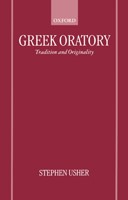 Greek Oratory: Tradition and Originality
Greek Oratory: Tradition and Originality
Contents
Cite
Abstract
Oratory became a more or less distinct genre of Greek prose literature some time around the middle of the fifth century nc. The uncertainties surrounding its beginnings do not allow a more precise dating. On one important aspect of its early development, however, confident assertion is possible: unlike other genres, oratory evolved under the stimulus of two agencies, that of the preceptor and that of the practitioner. From the start there were teachers instructing would-be orators in what to say, how and in what order to say it. By the time of Antiphon, the first Greek orator whose speeches have survived, the work and influence of the teachers had crystallized into a body of topics and types of argument which only the most talented (or foolhardy) might ignore. An attempt, such as is envisaged in the present enquiry, to assess the literary achievement of each of the Attic orators, must logically approach their texts with the initial intention of trying to identify what they received from the first teachers, before examining the merit of what may seem idiosyncratic and original. The tradition begins with these early teachers, and it is necessary to clarify the form in which their instruction was transmitted.
Sign in
Personal account
- Sign in with email/username & password
- Get email alerts
- Save searches
- Purchase content
- Activate your purchase/trial code
- Add your ORCID iD
Purchase
Our books are available by subscription or purchase to libraries and institutions.
Purchasing information| Month: | Total Views: |
|---|---|
| September 2024 | 2 |
| October 2024 | 9 |
| December 2024 | 1 |
| January 2025 | 7 |
| March 2025 | 5 |
| April 2025 | 2 |

Get help with access
Institutional access
Access to content on Oxford Academic is often provided through institutional subscriptions and purchases. If you are a member of an institution with an active account, you may be able to access content in one of the following ways:
IP based access
Typically, access is provided across an institutional network to a range of IP addresses. This authentication occurs automatically, and it is not possible to sign out of an IP authenticated account.
Sign in through your institution
Choose this option to get remote access when outside your institution. Shibboleth/Open Athens technology is used to provide single sign-on between your institution’s website and Oxford Academic.
If your institution is not listed or you cannot sign in to your institution’s website, please contact your librarian or administrator.
Sign in with a library card
Enter your library card number to sign in. If you cannot sign in, please contact your librarian.
Society Members
Society member access to a journal is achieved in one of the following ways:
Sign in through society site
Many societies offer single sign-on between the society website and Oxford Academic. If you see ‘Sign in through society site’ in the sign in pane within a journal:
If you do not have a society account or have forgotten your username or password, please contact your society.
Sign in using a personal account
Some societies use Oxford Academic personal accounts to provide access to their members. See below.
Personal account
A personal account can be used to get email alerts, save searches, purchase content, and activate subscriptions.
Some societies use Oxford Academic personal accounts to provide access to their members.
Viewing your signed in accounts
Click the account icon in the top right to:
Signed in but can't access content
Oxford Academic is home to a wide variety of products. The institutional subscription may not cover the content that you are trying to access. If you believe you should have access to that content, please contact your librarian.
Institutional account management
For librarians and administrators, your personal account also provides access to institutional account management. Here you will find options to view and activate subscriptions, manage institutional settings and access options, access usage statistics, and more.